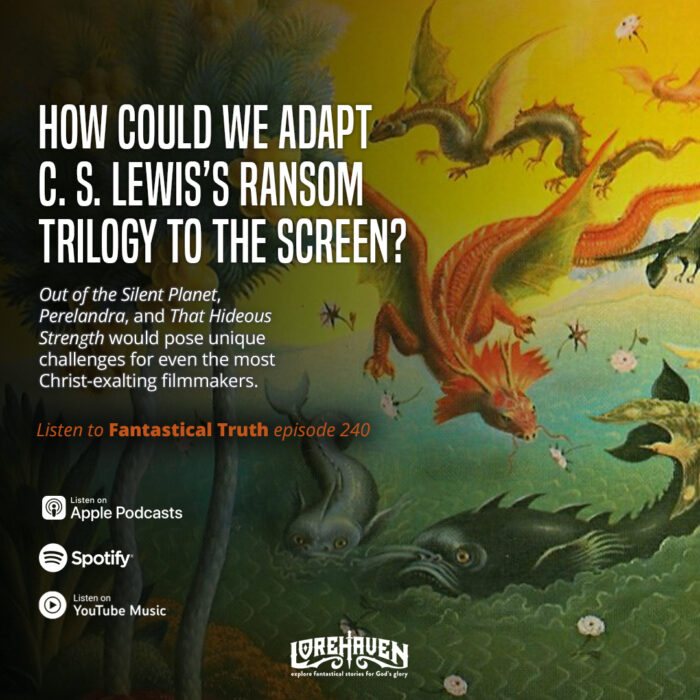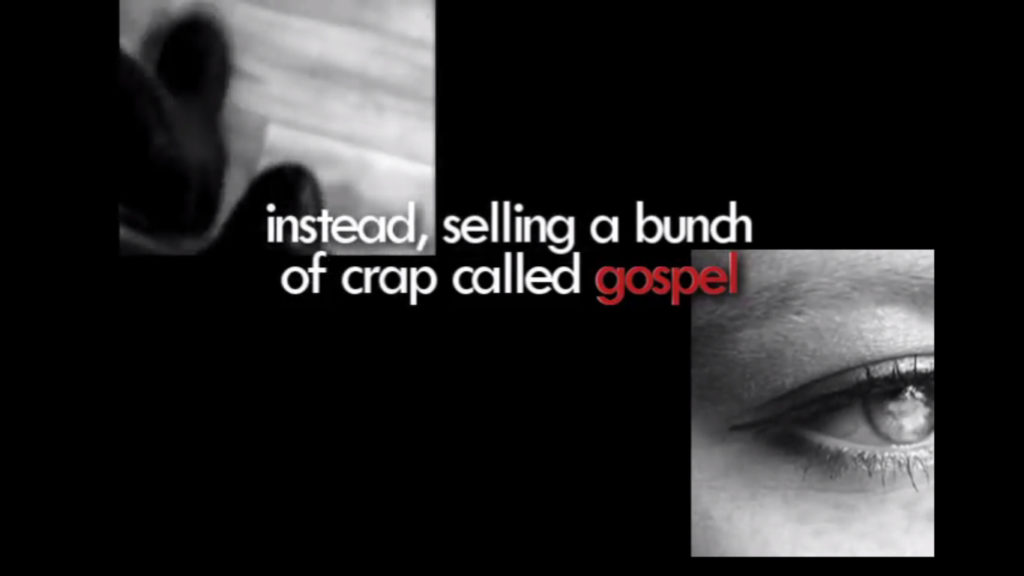Christian Movies Can Show Better Sermons
Some of my recent conversations about Christian movies have helped me flesh out something.
Often fans of the Christian movie-sermon–a Christian movie that serves as a 1.5-hour sermon illustration–will praise the movie for that aspect. And critics of the genre, such as myself, will say or come across as saying that we dislike movies that act as sermons.
The complaint goes out: “Christian movies shouldn’t be like sermons!”
Actually I believe I disagree.
For now let’s concede that it’s fine if all/most Christian movies–certainly the most popular ones–are like sermons.
But why must the movie-sermons be almost exclusively about shallower and/or spiritual-milky sermons?
When will audiences be naturally and enthusiastically ready to want to see other movie-sermon styles and themes?
Perhaps themes that are not limited to family, or moral practices, or potentially simplistic happy ends?
How about a Christian movie-sermon that shows (more than tells) some strange and incredible aspect of the gospel?
Like the nature of God himself? Like the nature of Jesus Christ today with all its awesomeness? His wrath and mercy, his compassion and discipline, His love and holiness, His divinity and humanity, His infinity and our personal relationship with Him?
But where to find source material?
A filmmaker could broaden his sermon preferences. Find other pastors. Find more-challenging sermons.
How about this excerpt from a sermon by John Piper? This could make for an amazing Christian movie.
Even a Christian movie that acts like a sermon.
This excerpt has everything to qualify for a God-exalting story and fiercely human drama:
- An epic spiritual battle
- Potential for a fantastical edge
- Obvious yet nuanced villains
- Organic international diversity
- Strong words a la Old Testament prophets
- Greed, wealth, prosperity–that lead to ruin
- Broken humanity broken further by suffering
- A potential Jesus-exalting hero who fights pain for his ultimate goal–God Himself.
Here’s the clip and transcript.
https://www.youtube.com/watch?v=PTc_FoELt8s
I don’t know what you feel about the prosperity gospel–the health, wealth, and prosperity gospel?
But I’ll tell you what I feel about it: hatred.
It is not the gospel. It is being exported from this country to Africa and Asia. Selling a bill of goods to the poorest of the poor! “Believe this message, your pigs won’t die. Your wife won’t have miscarriages. You’ll have rings on your fingers and coats on your back.” That’s comin’ out of America!
The people that ought to be giving our money and our time and our lives, instead selling them a bunch of crap called “gospel.”
And here’s the reason that it is so horrible. When was the last time that any American, African, Asian ever said, “Jesus is all-satisfying because you drove a BMW?”
Never!
They’ll say, “Did Jesus give you that?”
Yeah.
“Well I’ll take Jesus!”
That’s idolatry! That’s not the gospel. That’s elevating gifts above Giver.
I’ll tell you what makes Jesus look beautiful.
It’s when you smash your car and your little girl goes flying through the windshield and lands, like dead on the street. And you say, through the deepest possible pain:
“God is enough. God is enough.
“He is good. He will take care of us. He will satisfy us. He will get us through this. He is our treasure.”
“Whom have I in heaven but you? And on Earth there is nothing that I desire besides you. My flesh and my heart and my little girl may fail, but you are the strength of my heart and my portion forever.”
That makes God look glorious, as God, not as giver of cars or safety or health.
Oh how I pray that America would be purged of the health, wealth, and prosperity gospel, and that the Christian church would be marked by suffering for Christ.
God is most glorified in you when you are most satisfied in Him in the midst of loss, not prosperity.
Which leads to the question: If someone did make a movie like this–creatively and professionally–would most Christians want to see it?











































Great thoughts. And would Christians want to see it? – good question! The prosperity gospel tendency runs so deep, and so many are Christians in name only, but not in heart. Those who exalt “morals,” but are not fully satisfied in God because they have their treasure here on earth, will not appreciate such messages. But those who DO love God, I think, would be blown away and edified by such a movie. (I feel like my blog post for today really ties in well with this!)
You know, John Piper does keep it real that’s for sure. I hope that more Christian movies will be more bold in doing that. I’ll never forget the first time I was exposed to the prosperity gospel. To be honest, I wasn’t sure what hit me when the one lady at my job said, “None of God’s prophets were ever poor.” To this day, I remember staring at her, wondering, “What Bible are you reading?”
However, we want to hear that. We want to hear that God’s gonna bless us with XYZ nice life icon. And there’s nothing wrong with wanting nice things but our job is not to clutch onto them with dying fingers. After all, this is not our permanent home.
Good post.
So true, Parker! Amen!
At this point I believe fans would respond with something like:
“Come on now. It’s just a movie. A movie can’t say everything.”
And my answer would be: That’s a switcheroo. The idea is that the movie is a teaching tool, a piece of a sermon or a sermon itself. So if that’s the idea of the movie, to be a sermon, then the movie has to play by good sermon rules.
Friends don’t let friends believe sermons with any kind of prosperity gospel — be it financial prosperity, family/relationship prosperity, or moral prosperity.
Why must Christian movie-sermons be shallow and milky? Because if they weren’t, they wouldn’t be recognizable as sermons.
What do audiences expect from a sermon? Clear-cut morality devoid of ambiguity. Nothing the whole family can’t handle. And, most of all, obvious personal application.
In a movie, those elements make for pathetic and disasterous storytelling.
What does it take to make a villain “nuanced”? Ambiguity. What does it take to show “broken humanity further broken by suffering”? Stuff the whole family might not be able to handle. What does it take to show greed, wealth, and prosperity leading to ruin? A non-appealing personal-application takaway.
I think it’s disasterous for storytellers to think of their stories as sermons, because that’ll lead them to bend their characters to serve their plot, which’ll get bent to serve their message. In the end, everything will feel contrived. Much better to write a story *about* a given subject — say, the prosperity gospel — than to write a sermon-story about how the prosperity-gospel is bad. It’s a slight distinction, but, I think, a crucial one. But that’s okay, ’cause what we want is nuance, ya?
Austin, has nothing to do with your response but you totally look awesome with the bow and arrow!
Amen to all of this. My personal preference is stories that “show, not tell” when it comes to spiritual things.
Sadly, from what I’ve seen on amazon[dot]com, so many Christians would get uptight if there was any kind of movie that had *any* degree of content that’s not family friendly and/or disagreed with some doctrine they fervently believe in.
Related to previously mentioned things, I think a wider yet harder-hitting question would be “can Christian media be not be strictly family-oriented and still be marketable?”
But the answer is obvious and also NO. Somebody needs to write an article on that, how nuclear-family-obsessive the Christian subculture is, and how that limits us. Heck, I might submit one.
Trust me, that topic is covered (though not well enough, not yet).
For example:
Alas, it’s way easier to identify other people’s idols than it is to identify our own.
I don’t know if I’ll believe it until I see something actually happening. Because there are plenty of old grumps argle-bargling about “extended adolescence” and immaturity because there are people who aren’t getting hitched and making kids at 21. Their definition of “adulthood” explicitly contains marriage and kids, and articles like above seem too anemic to really count as pushback.
Okay, I have to admit, I got a little distracted with the “movies-as-sermons” comment, but beyond that, good post. 😛
For now let’s concede that it’s fine if all/most Christian movies–certainly the most popular ones–are like sermons.
Because they are telling me what love, justice, and mercy are, rather than demonstrating them. Because sometimes they have bad theology, and that will make for a bad sermon.
When people stop getting excited about a “Christian movie” and start getting excited about “a glorious story.”
I am not sure this is entirely the case, though I will give you “simplistic happy endings.” However, many stories end on a relatively happy note so I’m not sure that’s the inherent issue either. I’ve seen far too many family-oriented, morally-centered stories with happy endings that work (not counting Old Yeller). Of course we should branch out, but even Lord of the Rings begins and ends with home.
I didn’t see Courageous or Flywheel, but I did see Fireproof, Facing the Giants, and part of God’s Not Dead (which…that title…), and my ultimate problem was neither the family aspect, morality lesson, nor the happy ending; my problem with the first two was that they did not go far enough. (Oh, I wound up seeing Unstoppable, too. I need an entire blog post to fully illustrate what was wrong with that movie, so we’ll ignore that one for now.)
By contrast, Toy Story 1 and Big Hero 6 are both extremely family-oriented revenge stories with strong moral themes and happy endings; Brave is about a bratty little girl who curses her mother and nearly destroys her family and her country over a marriage tradition, with equally strong themes on family, morality, and happy ending (weirdly enough, I think that one succeeded where The Little Mermaid didn’t quite – that might be a fun comparison). Finding Nemo, The Incredibles, and How to Train Your Dragon follow a similar pattern with different themes. (I used BH6, TS, and Brave because those are…themes generally left to the adult genres; BH6 is the first kids’ movie to surprise me since Brave.)
I think this hits the mark: These movies too often do not go far enough. They aren’t really hitting any of these. I’m not even sure they’re hitting “love and mercy” most of the time. But then, you can’t understand the grace and kindness of God until you have some understanding of his holiness, justice, and righteousness. The beauty of Ezekiel 1:1-2:8 is in the sight of the absolute most splendid of persons stepping down from a throne that makes that beautiful scene of Asgard in the Thor movies look like it was made from a garbage can, stooping, picking his loyal friend and subject whose been taken hostage by an enemy off the ground, and saying, “Don’t be afraid. You are still mine, and I will still speak through you.” (my paraphrase) Until we can see that, I don’t think we see at all.
I loathe the prosperity Gospel, but I am not sure I would see that type of film either unless the film is at least bitter-sweet minimum. I prefer happy endings. I agree that too many ones are saccharine sweet, but you can have asversity and happiness. The Last Airbender’s three seasons, for instance.
“It’s like when you smash your car…”
That doesn’t make Jesus look beautiful. God isn’t glorified by our acknowledging him over the back of our dead kid. It’s more that we can only surrender to Him a burden and a pain we can’t bear, and Piper sounds particularly monstrous in saying that.
A movie like that would be worse than War Room. It would paint us as monsters unless done with sensitivity, and a focus on the people more than God. You can’t tackle theodicy with that stupidity from Piper, that dismissal of human suffering so easy and trivialization of pain in the name of God. Even Jesus wept blood and prayed the cup be taken from him.
Really disappointed in seeing you think that’s an awesome idea for a movie.
Sounds like you have absolutely been challenged by the “plot,” and would find this action by a hero absurd, fascinating, and inscrutable. Meaning it’s a movie that would spark a lot of conversations beyond the oft-facile response to suffering (when it does occur) in existing Christian movies.
You’re setting up a straw man. The response to God is not some kind of emotionless-mechanical posture. (Even Vulcans have more emotions than this.) It is a desperation, wailing, groaning, struggling, screaming, clinging to the only source of Comfort in a world that shudders under evil’s consequences. Other responses are the responses that are sentimental, deceptive, inhuman, and hurtful. (Other than the sentimental minimization of true pain and horror, we also refuse to recognize that God — however you believe in His sovereignty — at the very least let the horror happen. Otherwise the Devil or sin are not inferior to God but are His counterpart.)
Rewrite the script, then. How would you have the parent in such a situation respond so far as God is concerned, other than crying out for Him? Begging for answers, but also begging for more of His presence and comfort?
I am afraid that by rewriting this, you must also rewrite the book of Job.
I will not say this is easy — particular if you’re in the midst of suffering now. God also comforts through human means (such as His Church). The sermon excerpt is a sermon excerpt, and thus illustrates a limitation. I did not suggest this would be the neat conclusion of a hypothetical Christan movie. Rather, it’s a tense and dramatic start to a potentially riveting drama.
You’re asking for something different than what Piper said. Piper would make a movie as bad as War Room, with a theology that would alienate everyone. You are asking for how to make a movie on theodicy work.
I don’t think I’d write that script, because there’s no way to deal with theodicy in film without oversimplifying to a dangerous degree. We’ve been wrestling with this for thousands of years. And Job’s point is that suffering has no answers-the thing about God doing it on a dare and telling Job and his friends to STFU is just that. All the explanations fail and go unanswered.
At best it would have to be something like The Bicycle Thief. Just showing what happens and ending with no real message. Or a very subtle one. Maybe all you could do would be show that at least, he chose not to “curse God and die.” But you wouldn’t be able to do facile stuff like showing him glorifying God: the images of loss would be too powerful to really make that a resolution.
Actually, it’s easy. It just requires guts. Think Braveheart, for starters.
http://youtu.be/D6PP-YS-FqU
Eww, no. No more Bravehearts need to exist, with their painful borking of historical accuracy right in the ear and their cheap fridging of especially women characters and wooden characterization and did I mention how they borked history right in the ear?
Mm. Well, since I consider Braveheart to be one of the greatest films ever made, I’m sorry, but I’ll have to just totally not care about anything you said, even if some of it was sort of accurate. Regardless, I brought up Braveheart not because of its historicity, but because it’s a highly successful example of a cinematic hero losing everything dear to him, and then refusing to submit to despair and self-interest, because his eyes were fixed upon a greater reward. In other words, it’s a movie about a martyr.
The prosperity gospel doesn’t even know what to do with martyrs.
We can agree that neither Piper nor anyone else on the “bench of bishops” should be making novels and plays in their spare time.
However, you are allowing your seemingly “dark!ness!no!parents” notion of theodicy–along with an apparent bias against Piper’s views as expressed here–to limit the story possibilities. Again, Piper would not mean to say or imply anything that meant a person could arrive in this life at a full resolution to theodicy either in belief or in practice. We can only barely start to find such a resolution, and fight for it over and over and over. As Austin said, the goal is not resolution in this life but in the next life. And that makes for an admirable character journey.
I see no reason whatsoever–other than a bias against showing hints of the miraculous–to deny that a movie character could choose, even once, to have faith in God in the midst of anguish. In that case I think your argument is against the Bible, which overtly promotes the concepts of clinging to God in the midst of suffering, even apart from explanations.
More below. (This sub-conversation is getting a bit messy in more than one way.)
It’s not clinging to God, it’s the problem of showing suffering glorifies God, or is used to the glory of God. All we can show is people clinging to God, and honestly. But Piper’s idea is not that.
And finally, for a little levity on the subject matter.
“… through the deepest possible pain ...”
Faith is the assurance of things hoped for, the conviction of things not seen. No one, least of all Piper, is suggesting that Christians should respond to pain like emotionless robots. Spend any amount of time in scripture — in the psalms, the gospels, the prophets, or Job — and that idea gets drowned in the sea of tears shed by those who don’t understand God’s purposes, and even by those who do. And yet, when all is said and done, what is the response of the faithful man or woman? Is it not to petition God for a redress of grievances — thereby acknowledging His sovereignty — and ultimately accept His answer — thereby acknowledging His goodness?
All one need do to glorify God is to speak accurately about Him, to speak the whole truth. “The Lord gave, and the Lord has taken away. Blessed be the name of the Lord.” We look at that statement and glorify God. But imagine if Job had said, “The Lord gave, and the Lord has taken away. Cursed be the name of the Lord.” In that case, Job would’ve been bringing God disrepute. He would have given up trusting the Creator of the universe. The slander would’ve been just as bad had he said, “The Lord gave, and Satan has taken away,” because then he would’ve been making God out to be small, weak, and pathetic. And remember, no one has ever had more of a right to say that than Job, as Satan had been explicitly allowed to utterly destroy his family, his possessions, and his health.
Faith is the assurance of things hoped for, the conviction of things not seen. How is it even possible to glorify the unseen God except by trusting what He says in the midst of excuses to doubt? What examples are given to us of faith playing out? “Some were tortured, refusing to accept release, so that they might rise again to a better life. Others suffered mocking and flogging, and even chains and imprisonment. They were stoned, they were sawn in two, they were killed with the sword. They went about in skins of sheep and goats, destitute, afflicted, mistreated— of whom the world was not worthy—wandering about in deserts and mountains, and in dens and caves of the earth.” (Heb. 11:35b-38) “These all died in faith, not having received the things promised, but having seen them and greeted them from afar, and having acknowledged that they were strangers and exiles on the earth.” (Heb. 11:13)
As per storytelling, people who look forward to a reward beyond this world make for vastly better protagonists than those who can’t see past their present pain, because with greater faith comes a greater willingness to take risks and make sacrifices while doing the right thing.
Maybe part of the problem is appearances. It’s a Christian sub-cultural assumption that people glorifying God in the midst of suffering makes Him look good. It’s a reaction that is justified for complicated reasons — the brokenness of all of life, the certain fatalistic victory of death from the human perspective, Jesus as the bearer of suffering and the bridge to God’s presence.
Showing a dead child and then hammering in an explicit “Praise God!” message would be horrible. Non-Christians wouldn’t see Job’s heroic perseverance. They would see masochists reacting to pain by cackling with insane glee. As a Christian, I would understand what the message would be trying to say, but I would feel the same distaste that I would have for any cheap spiritual message jumping to conclusions (even a true conclusion) without going through the whole process to justify that message either artistically or intellectually. That distaste would presumably be combined with the queasiness over death being treated insensitively—but I grant that Burnett’s proposing some hypothetically awesome movie-sermon that would somehow manage enough nuance not to seem all that insensitive.
Maybe it’s only my prejudice against most sermonizing, but I would think that a truly masterful film that showed God’s glory in the face of utter desolation would have nothing in common with a sermon.
— TL;DR summary —
The glory of God in His sovereignty in the midst of the specific case of the gruesome death of child is a message that can’t be communicated honestly or responsibly without dealing with the legitimate repulsiveness of the tragedy. I question whether this specific message is even possible to communicate responsibly in a sermon even though it is true; the preacher very easily does sound inhumanely cruel.
What you’ve described is a sermon illustration: character is subordinate to plot is subordinate to message. The message dictates that the bereaved parent must glorify God in the midst of loss, therefore the father reacts to his child’s death with “Praise God!”, thereby destroying his credibility in the eyes of anyone who’s lived for more than a week on planet earth.
This is why sermon-stories don’t work. Because they take shortcuts around human nature in order to “get to the point.”
How does a realistic, three-dimensional character respond to profound loss? By bawling his eyes out and screaming at God and becoming judgement-impaired and losing sleep for a year. And then, once he’s gone through the stages of grief, once we know he’s actually real, then his decision to trust in God’s sovereignty will actually mean something to us, because we’ll have seen what he’s had to overcome to get there.
That’s the difference between a sermon and a story. A sermon tells; a story shows. A sermon focuses on its audience’s mind; a story reaches for the heart. People listen to a sermon because they know they should; they consume a story because they feel compelled.
“The Lord gave, and the Lord has taken away. Blessed be the name of the Lord.”
That’s the phrase that sent so many people to the Prosperity Gospel that it isn’t funny. It’s been used very badly, as a way to shut people up or minimize their suffering. It also implicates the Lord in actively causing it.
This is the territory of personal anecdotes, which makes any further conversation difficult. I can understand you feel strongly this way, but first, you’ve not proven that this is the exclusive or majority reason people have opted for “prosperity gospel” nonsense; second, you’ve not yet acknowledged that no one here has advocated for a stereotypically fatalistic or inhuman response to suffering; third, you seem not to recognize that any Christian, no matter his/her view on God’s sovereignty, <em>must</em> account for the fact that God in some way permits suffering to occur, else we are no longer speaking of the biblical God.
However, the very fact that this discussion ensues persuades me even more than theodicy would be an amazing topic for a deeper-thinking Christian movie to explore. I believe an honest story would find some answers, such as that God does allow suffering/sin for greater reasons we cannot know. But I also believe an honest story would acknowledge that these answers are only a start. They do not finish. And they certainly don’t always comfort. (Wise Christians don’t immediately hurl Romans 8:28 at someone whose beloved spouse or child has just died of cancer.)
Edit: The best biblical yet compassion book I have read about a Christian response to suffering and death is If God is Good by Randy Alcorn. It’s the logical followup to his big book Heaven, which of course is also a must-read.
The Bible’s quite explicit that everything Job suffered was under God’s absolute control. Satan couldn’t touch a single hair on Job’s head without God’s express permission. So if you want to argue that point, you’re arguing with God, not with me.
Also, the fact that truth can be conveyed in unloving ways doesn’t make it any less true. While God’s sovereignty over our suffering should never be used as a bludgeon to shut people up, it’s a truth whose neglect created the prosperity gospel in the first place, consigning untold millions to the delusion that God defers to human beings. It promises people a measure of control over their own lives, then delivers despair when all their offerings and incantations fail to work. The actual truth — that God is ultimately in control and can be trusted to accomplish His will — is far, far less cruel. Mostly because it’s actually true.
In the end, what it all comes down to is this: are we gonna act like God is both sovereign and good, or are we gonna act like He’s not? If the latter, then all our insistence that “We trust God!” is hollow and specious. Suffering is where the rubber of theology meets the road of life. Even when there’s blood on that road.
it’s really not that comforting, only to people who don’t suffer. To use a prosperity example, one of my mother’s friends belied it for her husband who has had serious back problems and walks with a cane all his life. She would go up in all the healing lines with him, etc. You can tell him God is in control and is working his will in that dude’s husband hobbling around with a cane, and you’re going to create an atheist.
Like dudes who go up in healing lines aren’t doing it because they have no faith in God being in control, but they believe God loves them and wants them well. When you say “the lord takes away,” you are saying God doesn’t want them to be well as opposed to fulfill his glory through their suffering. Or rather, that their suffering now is less important than what it produces in eternity. That…that is problematic to say the least.
And no offense, neither of you get the prosperity gospel enough to know whats wrong about it. I understand that we can’t use scripture as talismans to compel God to act, but man, you guys think people who believe that are all fat-catters who want to get all the good stuff. They aren’t, they are like a lot of people Jesus met, who are reaching out in faith. It sucks that the theology is bad and bandits misuse that faith to line their pockets, but the desire is in believing God is good, and that He keeps the promises in His word.
Movies in general are often sermons in disguise. My husband and I love to curl up and watch Netflix and one of the things we’ve noticed is that there are often (almost always) some message just under the surface of almost every decent movie. Most of those sermons are secular messages. Some are more overt than others. Christians have mostly ceded the field to the secular message-makers and we have by and large lost our voice to our culture because of our timidity. Why?
We’re afraid to offend anyone and those strong prophet words were and should be offensive.
The Christian life used to end in some tough places — hanging upside down on a cross, for example — but we don’t want to believe that it could happen now and here.
Christians sin and suffer consequences, even as we are forgiven of our sin, but Christians prefer to think of ourselves as ethical and “good”.
There are ways to weave faith into books without hitting the reader over the head with a sermon, but a lot of Christian readers are offended when writers who are Christians do that. “Why is your gospel message so veiled?” was what a former beta reader said to me.
So, would the greater Christian movie audience react any differently to more reality-based movies?
I don’t know. I think maybe non-Christian audiences might be more accepting of the gritty theme with Christian sympathies than Christian audiences will be.